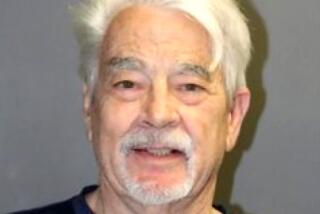Professor’s academic freedom was violated, UC Davis faculty leaders say
UC Davis faculty leaders have declared that medical school administrators there violated the academic freedom of a professor who published a 2010 opinion article criticizing a campus event promoting prostate cancer screening.
In a unanimous vote, the faculty Senate’s Representative Assembly admonished administrators for threatening cuts in title and funding and possible legal action against medical professor Michael Wilkes after his piece appeared in the San Francisco Chronicle. The faculty governing panel last week also called for medical school leaders to apologize and “take concrete steps to prevent future violations of rights of academic freedom.”
Although disciplinary action was not carried out against Wilkes, raising that possibility violated his rights, according to microbiologist Linda Bisson, who chairs the UC Davis faculty Senate. “It’s not a gray area or even a little cloudy. This is a textbook example of what is protected in academic freedom,” Bisson said Wednesday.
The next step is up to campus Executive Vice Chancellor Ralph Hexter, who in consultation with Chancellor Linda P.B. Katehi is expected to decide by fall whether to impose any discipline on the medical school executives, campus officials said.
In their co-written newspaper article, Wilkes and USC emergency medicine professor Jerome Hoffman wrote about research showing that PSA blood tests for prostate cancer may lead to unnecessary treatments that cause negative side effects. They suggested that a UC Davis public seminar that promoted such screening “just might have to do with money” and that doctors involved could have a conflict of interest.
In an email soon after, the medical school’s executive associate dean stated that Wilkes might be removed from his post as director of global health and from some training responsibilities, according to a recent report by a faculty committee. Then, a campus health center attorney wrote to Wilkes about what he alleged were factual mistakes in the article that hurt UC’s reputation and were “potentially actionable under the law of defamation.”
In an telephone interview Wednesday, Wilkes said he regretted some of the “edgier” language in his article and wished the matter could have been resolved long before it came to a formal investigation.
“All I want is an apology and a road map to show that, if this happens against other faculty, there are ways to deal with this that do not involve intimidation. And that they rely on the foundation of academics, which is debate and discussion,” said Wilkes, a prostate cancer expert who moved from UCLA to UC Davis eight years ago.
Administrators contended that discussions about Wilkes’ job titles were not related to the article and resulted from previous performance reviews. The campus attorney said the letter about defamation was not meant as a threat but just “a statement of fact,” the faculty report said.
Two medical school leaders involved said in an email Wednesday that it would be inappropriate to comment in detail on the issue, which was previously reported by the online publication Inside Higher Ed.
But school Dean Claire Pomeroy and Executive Associate Dean Frederick Meyers also wrote: “We deeply regret that the handling of this particular personnel matter is perceived by some as a violation of academic freedom.... We respect and protect the rights of our faculty to pursue their research and teaching as they wish, so long as it is in a manner that is consistent with professional standards.”
The 2010 men’s healthseminar, a free event, was sponsored by the UC Davis Health System in affiliation with the American Urological Assn. Foundation and the National Football League.
More to Read
Sign up for Essential California
The most important California stories and recommendations in your inbox every morning.
You may occasionally receive promotional content from the Los Angeles Times.











